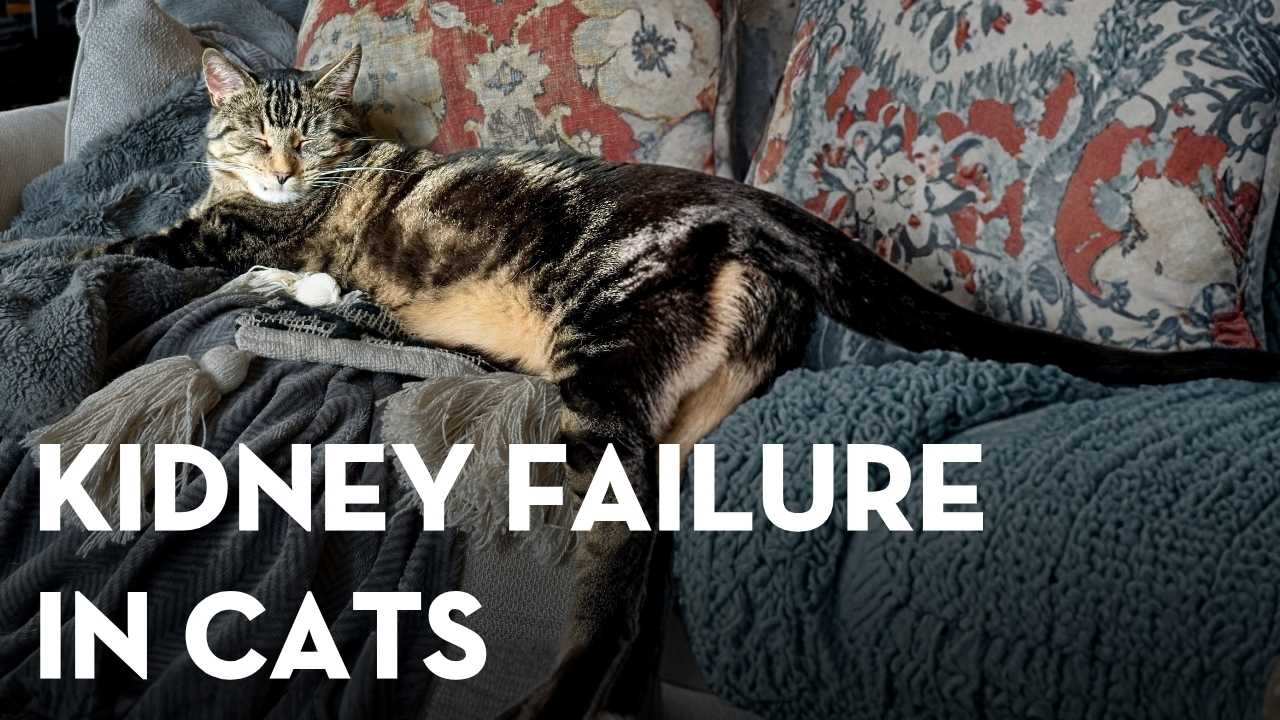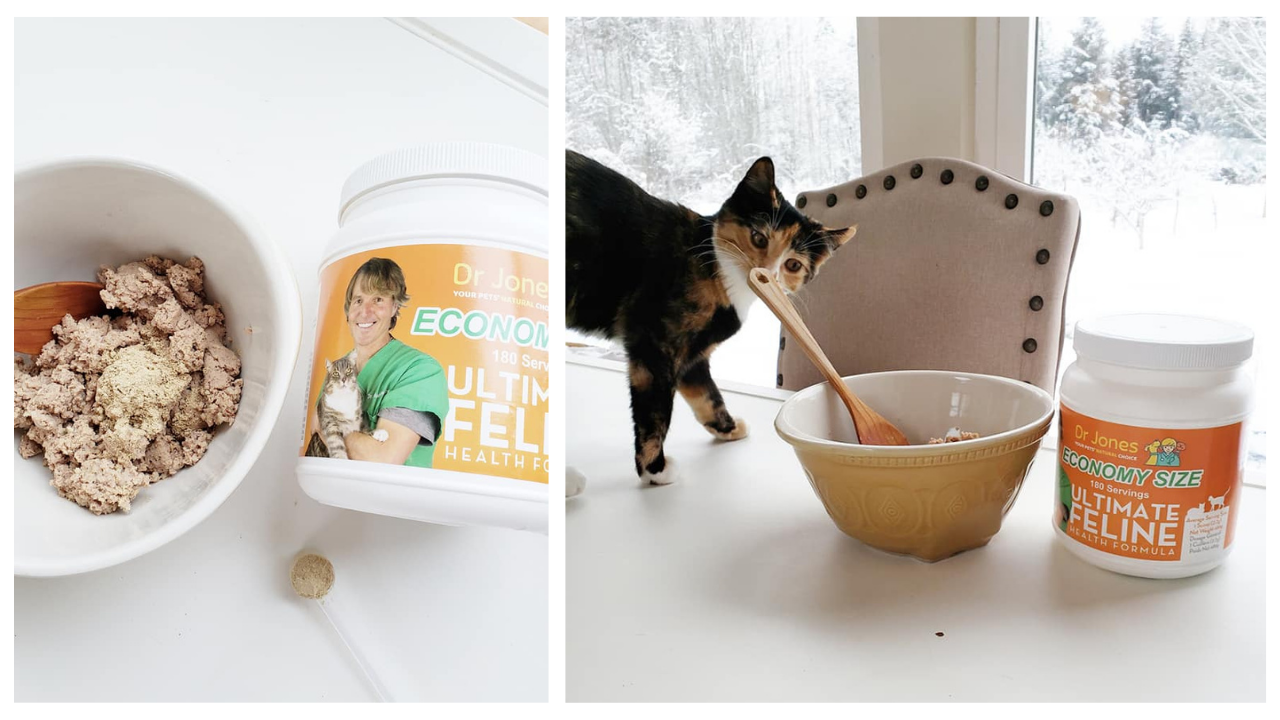Kidney Failure in Cats: Early Signs, Causes, and Effective Treatments
![]()

Cat Kidney Failure Symptoms You Should Never Ignore
Is your cat drinking more water than usual or losing weight unexpectedly? These could be signs of kidney trouble—a common issue in older cats that can seriously affect their quality of life. In my latest guide, I break down what to watch for, what causes kidney problems, and the practical steps you can take to support your cat’s health at home. From hydration tips to probiotics, phosphorus management, and safe stomach support, I cover it all.
And to help keep your feline thriving, my Ultimate Feline Health Formula is designed to support kidney function, digestion, and overall wellness—giving your cat the care they deserve every day.
And to give your cat an extra boost, my ULTIMATE Feline Health Formula is packed with antioxidants, joint support, and kidney-protecting ingredients—everything your senior cat needs to stay vibrant and thriving.
Grab your bottle today and help your cat enjoy their golden years to the fullest!


Kidney Failure in Cats: What You Need to Know
Kidney failure in cats is a serious condition, but understanding the signs, causes, and solutions can make a big difference in your cat’s quality of life. Here’s what I want you to know.
Signs of Kidney Failure
One of the first things you might notice is increased thirst and more frequent urination. Weight loss is another common sign, especially loss of muscle mass, as the kidneys struggle to retain protein. In advanced cases, your cat may become weak due to anemia.
Other signs can include:
-
Loss of appetite
-
Dehydration
-
Changes in vision (from elevated blood pressure in some cats)
Causes and What Happens Inside
Kidney failure happens when toxins build up in the bloodstream. This can decrease your cat’s appetite and, in advanced stages, leave your cat completely off food.
Many veterinarians traditionally recommend a low-protein diet, but research shows that restricting protein doesn’t prevent further kidney damage.
Instead, specialists now advise:
-
Maintain adequate protein levels
-
Focus on reducing phosphorus, the mineral in animal protein that can harm kidneys
Solutions: Helping Your Cat Thrive
1. Hydration is Critical
Fluid support is the cornerstone of kidney care. Make sure your cat always has fresh water available.
If your cat isn’t a big water drinker:
-
Switch to canned food
-
Learn to give subcutaneous fluids at home to flush kidney toxins
-
I show you exactly how in this video: Subcutaneous Fluids for Cats
-
2. Probiotics for Kidney Support
Azodyl is a natural probiotic that helps flush uremic toxins from the bowel, slowing further kidney damage.
-
Dose: 1 capsule per 10 lbs daily (max 4 capsules/day)
3. Reduce Phosphorus
Phosphorus is the main mineral that accelerates kidney damage. Early management includes:
-
Feeding lower-phosphorus diets
-
Using phosphorus binders
Aluminum Hydroxide (ALOH) is an effective binder:
-
Odorless and tasteless, can mix with food
-
Dose: ¼ teaspoon per 10 lbs daily (must be given with food)
Calcium Carbonate (Tums) also works for high phosphorus:
-
Dose: ¼ tablet (650 mg) per 10 lbs, twice daily
4. Managing Upset Stomach
Kidney disease often causes nausea or stomach upset. Safe options include:
Famotidine (Pepcid):
-
OTC antacid, works well in cats
-
Dose: ¼ tablet (2.5 mg) per 10 lbs, twice daily
Slippery Elm (Natural Antacid):
-
Effective for chronic kidney disease (CKD) cats
-
Dose: 1 capsule (400 mg) per day, sprinkled in food
Takeaway
Kidney failure doesn’t have to mean poor quality of life. With proper hydration, diet, probiotics, phosphorus control, and stomach support, you can help your cat feel better and slow disease progression.
Remember, early intervention makes a big difference—so watch for the signs, act quickly, and give your cat the care they deserve.
Click to get A Free Copy of My E-Book!

And to help keep your feline thriving, my Ultimate Feline Health Formula is designed to support kidney function, digestion, and overall wellness—giving your cat the care they deserve every day.
And to give your cat an extra boost, my ULTIMATE Feline Health Formula is packed with antioxidants, joint support, and kidney-protecting ingredients—everything your senior cat needs to stay vibrant and thriving.













Is there a negative to giving aluminum hydroxide “Phos Bind” to 17yr old cat for kidney disease? I purchased but now am worried after reading some literature on this problem especially “brain issue”.
Is there any alternative of azodyl. We don’t this in my country. What type of probiotics can i give to my cat with kidney disease? Also we Don’t have tums here. Can I give ground eggshells instead of tums? The ALOH we have in our country is the combination of (Aluminium Hydroxide + Magnesium Hydroxide
250 mg+400 mg)
Yes, there are alternatives to Azodyl:
Use a human renal-specific probiotic with strains like Lactobacillus acidophilus, Bifidobacterium longum, or Enterococcus thermophilus.
Dr. Mercola Complete Probiotics or Renew Life Ultimate Flora (low-dose versions) are often used.
For phosphate binders:
Yes, you can give ground eggshells (1/4 tsp = ~500 mg calcium carbonate) instead of Tums.
Avoid the ALOH combo with magnesium—magnesium can be risky for cats with kidney disease.
Thank you for replying. Unfortunately, the probiotics you mentioned are also not available in my country. The probiotic combination we have contains –
“Lactobacillus acidophilus (2 billion)
Lactobacillus bulgaricus (1 billion)
Bifidobacterium bifidum (1 billion) as a 4 billion probiotic combination and
Fructo-oligosaccharides (100 mg)” each capsule. Will it be ok for cats in low dose? If it is safe what will be the dose per 10lbs?
I don’t believe fructooligosaccharides is safe for pets. It’s an addition of different types of fiber to feed the bacteria(probiotics). So I wouldn’t. Where do you live?
Fructooligosaccharides (FOS) are generally safe and beneficial as a fermentable prebiotic fiber in cats and dogs: they help feed good gut bacteria, produce healthy short-chain fatty acids, reduce harmful microbes, and may improve digestion and weight maintenance
In cats with chronic kidney disease, FOS has been shown to lower uremic toxins and support gut–kidney health when given in small, controlled amounts
However, FOS can bind calcium and potentially raise blood calcium levels—this is a concern in pets with hypercalcemia, so careful monitoring is advised
Can I give my cat azodyl with Dr.Jones Ultimate feline (which she takes everyday)?
They both have probiotics, so I didn’t want to give her too many probiotics. However, I’d really like to give the azodyl also because it has specific strains that are different than what’s in ultimate feline…
You can use them together